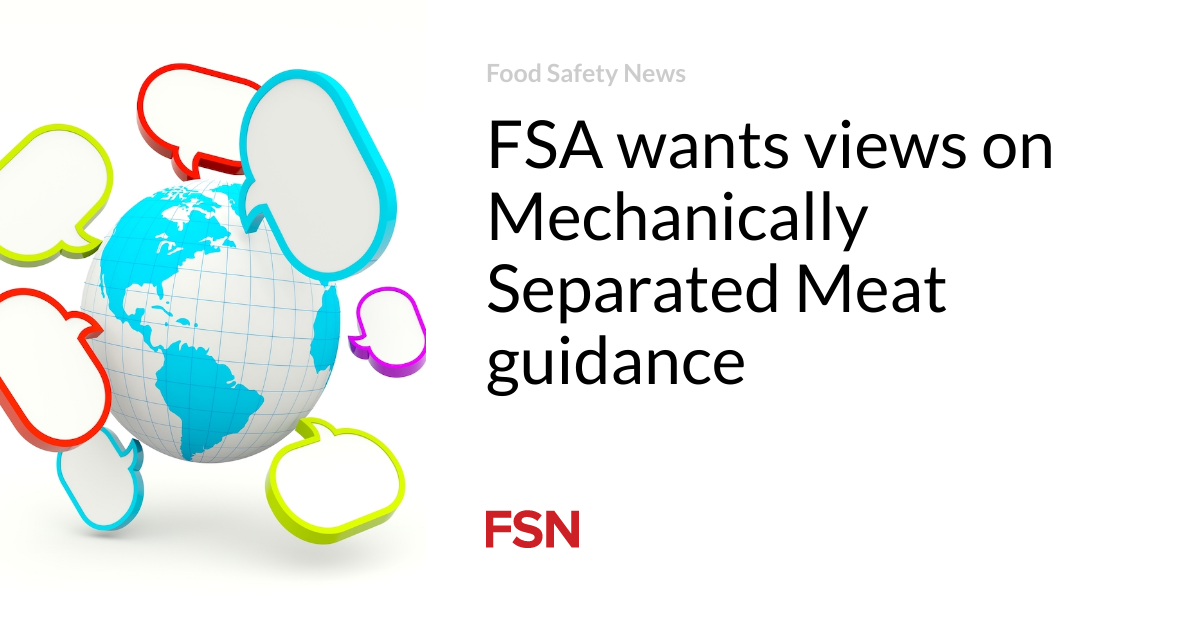
The Food Standards Agency (FSA) is seeking comments on guidance covering Mechanically Separated Meat (MSM).
New guidance was developed for food businesses following a series of court judgments on the definition of MSM, obtained by removing meat from bones.
Decisions by the court clarified what MSM is, how food businesses should interpret the definition, and how they should apply it to their products. Several legal cases culminated in a 2022 High Court Judgment.
Some firms in England, Wales, and Northern Ireland will be affected by the court rulings, and the FSA said businesses may need time to adapt their processes and how they classify products.
“We understand that this ruling will impact businesses, so it is right that we seek views from consumers and industry, on the guidance to maximize its effectiveness,” said Rebecca Sudworth, director of policy, at the FSA.
“We’re doing this to ensure businesses have extensive opportunities to feed in. Food businesses are responsible for ensuring they comply with food law, and the FSA has committed to developing new guidance on MSM to aid understanding following the court judgments.”
Impact of guidance
FSA also asks for input on an impact assessment from companies affected by the guidance.
MSM produced from pork or poultry in line with regulatory requirements is safe to use as an ingredient in foods. The use of cattle, sheep, and goat bones, or bone-in cuts, as raw material for MSM is prohibited.
MSM does not contribute to the meat content of final products and must be in the ingredients list as Mechanically Separated Meat with the name of the animal species from which it derives.
It is of lesser commercial value than fresh, ground (minced) meat and meat preparations, which do contribute to the meat content percentage on product labels. This means classification is significant for food businesses and consumers.
Court judgments mean there may be products previously not classified as MSM that now must be. Companies using mechanical meat separation equipment may need to relabel products to comply with regulations. Some firms may have to make operational changes to meet hygiene regulatory requirements. Businesses that switch to MSM activity require approval from either the FSA or their local authority.
The consultation closes on May 22, 2024; more information can be found here.
FSA supports the Brazilian decision
Meanwhile, the FSA has backed a decision to lift enhanced import controls on beef and poultry from Brazil and restrictions on listing such establishments for export to Great Britain.
In March 2017, a police investigation into fraud and corruption in the meat sector in Brazil involving companies and official inspection staff, called Operation Carne Fraca, was revealed.
The European Commission delisted involved establishments that had been approved for EU exports. Based on an audit, the EU reinforced import controls for Brazilian beef, poultry meat and meat products in March 2017. These measures remain in force.
In August 2021, Brazil asked the UK to review import controls. An audit in 2022 led by the Department for Environment, Food and Rural Affairs (Defra) found Brazilian authorities had taken steps to rectify their national food safety control systems following recommendations from EU audits.
There have been 36 border notifications, and 17 intensified official controls for products of animal origin since January 2021. However, the FSA said reverting to the default level of controls means imports from Brazil will be subject to risk-based checks at the border, and intensified official controls can be put in place if non-compliant consignments are found.
In February, a regional court in Santa Maria, in the state of Rio Grande do Sul, denied the request of a local unnamed slaughterhouse to annul a fine imposed by the Ministry of Agriculture and Livestock (Mapa) based on findings as part of Operation Carne Fraca.
The judge ruled the penalty was correct, and the company was told to pay Brazilian Real $450,000 (U.S. $90,800). In June 2021, the meat firm filed a case against the decision covering issues found in 2017 and can still appeal the verdict.
(To sign up for a free subscription to Food Safety News, click here.)
